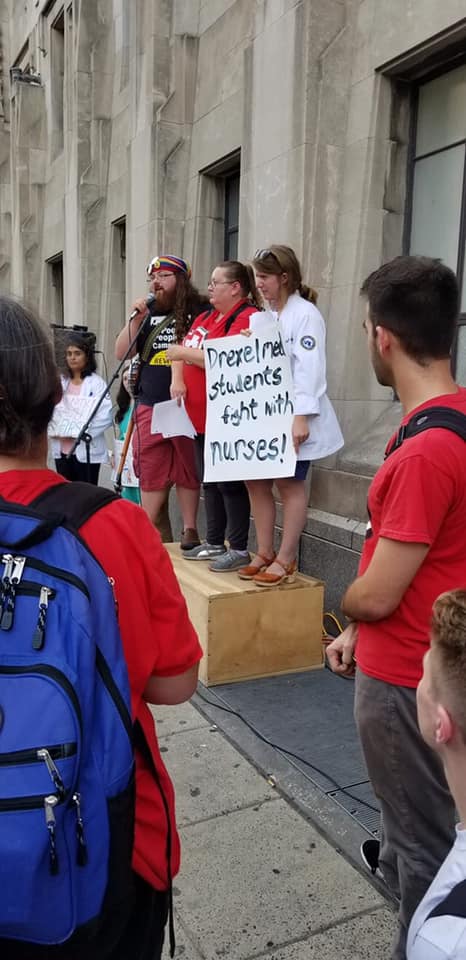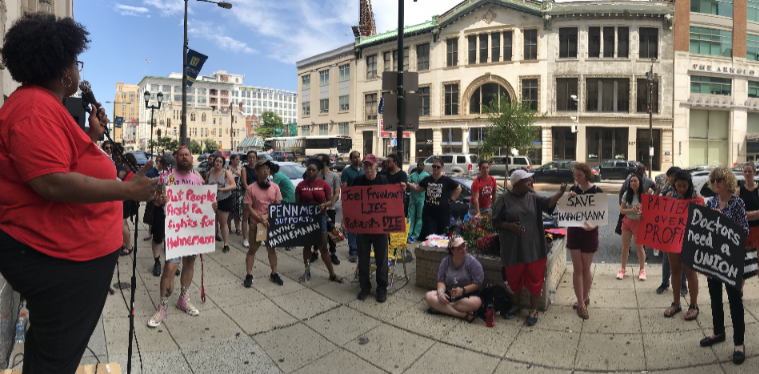This Spring, Hahnemann Hospital, a 150+ year old Philadelphia Institution, declared bankruptcy and began the process of closing its doors. Here is the story of Hahnemann through member stories.
Member Remarks given at the Poor People’s Campaign: A National Call for Moral Revival Hearing
Clarissa O’Conor

My name is Clarissa O’Conor, and I grew up in Lancaster, Pennsylvania. I am currently a third-year medical student at Drexel University College of Medicine and a member of Put People First! PA.
I had just started my third year of medical school at Chester Crozer Hospital in June when I heard that Hahnemann Hospital was closing. Hahnemann was the main teaching hospital of Drexel. The hedge fund manager who had purchased Hahnemann a year earlier was filing for bankruptcy, having separated the valuable Center City real estate from the hospital itself.
Hahnemann Hospital opened in 1885, and became the de facto city hospital for the city of Philadelphia, serving mainly people on Medicaid and Medicare. Over 2,500 people are losing their jobs. 570 residents and interns, or doctors in training, had to scramble to relocate. This is a crisis.
I will not have the opportunity to learn from the doctors, nurses, and patients at Hahnemann Hospital. Since the closing, I have learned amazing things about the hospital. For example, Hahnemann midwives and ob-gyns built relationships with home birth midwives so that people laboring at home could be safely transferred to the hospital if needed. I also learned from members of ACT-UP that Hahnemann was the first hospital in the city to offer care to people who have HIV and AIDS.
There is no doubt that the closure of Hahnemann Hospital is a symptom of our ongoing healthcare crisis and the war on the poor writ large. In the City of Philadelphia the total number of primary care providers accepting Medicaid has declined in recent years. Communities with the lowest supply of primary care providers are more commonly low-income and have high proportions of people of color. There are 520,457 people on Medicaid in Philadelphia (33.2% of the population).
Hospitals are also closing across the country, especially in rural areas. In my hometown of Lancaster, PA, UPMC closed St. Joe’s Hospital, leaving the city with one emergency room.
People in power, like the Drexel medical school administration, want us medical students to “feel bad for the people affected most by the closure.” It’s not hard to see this rhetoric as an attempt to cool our righteous anger and keep us from organizing. I am here to say that I am directly affected by the healthcare crisis, and I refuse to see my interests as separate from those of the patients and employees of Hahnemann Hospital. My membership in Put People First! PA has allowed me to see the closing of Hahnemann Hospital for what it is – a symptom of the ongoing crisis and war on the poor and dispossessed and an opportunity to organize our community, including medical students and healthcare workers, into our organization and vision of healthcare for all, no exceptions, and a united poor and working class across Pennsylvania.
We as Put People First! PA demand an end to hospital closures; a Public Healthcare Advocate, who will fight for the healthcare rights for all Pennsylvanians; the protection of Medicaid with no cuts or hurdles, the restoration of the adult benefit in Medicaid, the protection of Medicare, and the implementation of single-payer universal health care for all and access to mental health professionals.”

Excerpt from remarks given August 20th at Kingsessing Public Library event on the closing of Hahnemann Hospital
Farrah Samuels
My name is Farrah Samuels, and I am a stage IV cancer survivor, and a proud member of an organization called Put People First! PA (PPF-PA). In the battle for securing all our human rights, we believe in supporting one another, which is why, most recently, we helped co-organize several rallies, protest actions and marches concerning the closing of Hahnemann Hospital in collaboration with PASNAP and District 1199c workers. It represents just one story in the recent onslaught of hospital and health care facility closings nationally that disproportionately affect low income individuals and working families. This deliberate attack on health care providers and the closing of facilities is a main component of this country’s ongoing war on the poor.
Safety-net hospitals such as Hahnemann, have primarily served the lowest income and most vulnerable patients; and they can play an important role in maintaining the health and safety of the public, just as our schools, libraries, police and firemen do. It is a real shame when safety nets such as Hahnemann are driven to closure by real estate entities seeking to turn over a profit on the backs of the poor and dispossessed. I work as a consultant for several of the City’s emergency shelters for the homeless, Center for Hope, SELF, and ODAAT, located in North Philly. Many of the homeless that come off the streets and enter the shelter system are then linked to permanent housing options through initial referrals from hospitals like Hahnemann. The condition of being homeless renders a lot of these folks medically fragile with a host of co-occurring chronic health conditions. Being on the street means they lack basic access to routine medical care. For years, Hahnemann has been the default healthcare provider of many of Philadelphia’s homeless. Sure, the homeless can go to other hospitals, but many of them stay and congregate in the neighborhoods surrounding Hahnemann; and in their fragile conditions, they may not make the journey as far as another hospital. Proximity can mean the difference between life and death very literally.
Hahnemann has also been the healthcare provider for many of Philadelphia’s inmate population from the county jail, Curran-Fromhold Correctional Facility. The jail routinely transported inmates to Hahnemann to address their medical needs. If you believe that healthcare is a basic human right, then you must also believe and support the notion that inmates are also entitled to medical care just like any other citizens. Many of us have experienced the trauma and pain of having a loved one locked up and wondering if they are ok or if they will get adequate care if they get sick. Where will they go now?
Hahnemann has also been a safety net hospital for many individuals covered by Medicaid and Medicare insurance, such as myself; and it has saved countless lives, including my own. In 2015, I was experiencing considerable stomach pain, fatigue and exhaustion.
At the time, I was an Adjunct Professor of a course at a local college and struggling to put my life back together after foreclosure on my home, the death of my father, the loss of my job, and a brief stint with homelessness. It was then that I learned that illness does not discriminate; and we are all just one diagnosis or step away from things falling apart. I made a salary of $5,000 that year, and as such, qualified for Medicaid. One day when the pain got too much to bear, I decided to go to Hahnemann’s Emergency Department. I was examined, diagnosed with fibroids after initial x-rays, and sent home.
I learned that the initial analysis of my x-rays had missed something and that I had a rare form of soft tissue sarcoma cancer called leiomyosarcoma. I was told I had three months to live and that I needed to seek follow-up care with a hematologist and oncologist.
I began a rigorous routine of inpatient chemotherapy on an aggressive combination of four potent chemotherapy drugs and would spend one out of every three weeks, staying at the hospital to receive this treatment.
The entire treatment ordeal lasted 18 months and on Election Day 2016, I woke up in remission and also overwhelmed by the news of who had won the Presidential election. I knew what this change in presidential administration could mean for other uninsured or Medicaid-insured poor people struggling with chronic health conditions and life-threatening illnesses. I cried tears of joy and sadness at the same time. Had it not been for Hahnemann and their due diligence, I would not have been diagnosed, and may never have had the fighting chance I did to make it through the fire and be here today. And had it not been for Medicaid, I would not have been able to afford the treatment that saved my life. Everyone deserves that same fighting chance that I had.
Hahnemann’s closing is a symptom of the larger financial and operational issues affecting hospitals nationwide. On average, in recent years, there have been 30 hospital closures in rural and urban annually; and this seems to be a trend with no end in sight. Meanwhile, hundreds of shiny, high-tech medical centers have opened in more affluent surrounding suburbs to cater to the rich in areas such as the Main Line.
It all begs the question of what health care really is and what we believe about it. Is it a basic human right, as we believe in Put People First! PA? Or is it a privilege for those who can afford it? Is it a commodity to be bought, sold, and traded by for-profit companies and investors more concerned with gentrification and building luxury condos for the rich than saving human lives? Help us secure care for all, stop the closure of more safety net hospitals and prevent needless deaths because every life matters.
*****************************
This content originally appeared in Put People First! PA’s semi-annual newsletter, The Keystone. The Keystone is a great introduction to Put People First! PA, our work, and our community. It’s all written by our members for our own communication and education, and for supporters and new relationships to get to know us better. Each issue features reports from our work, news about our victories, stories about the health care system and the other issues affecting our communities, and poetry and artwork. Check out past and present editions here: Newsletter Archive.